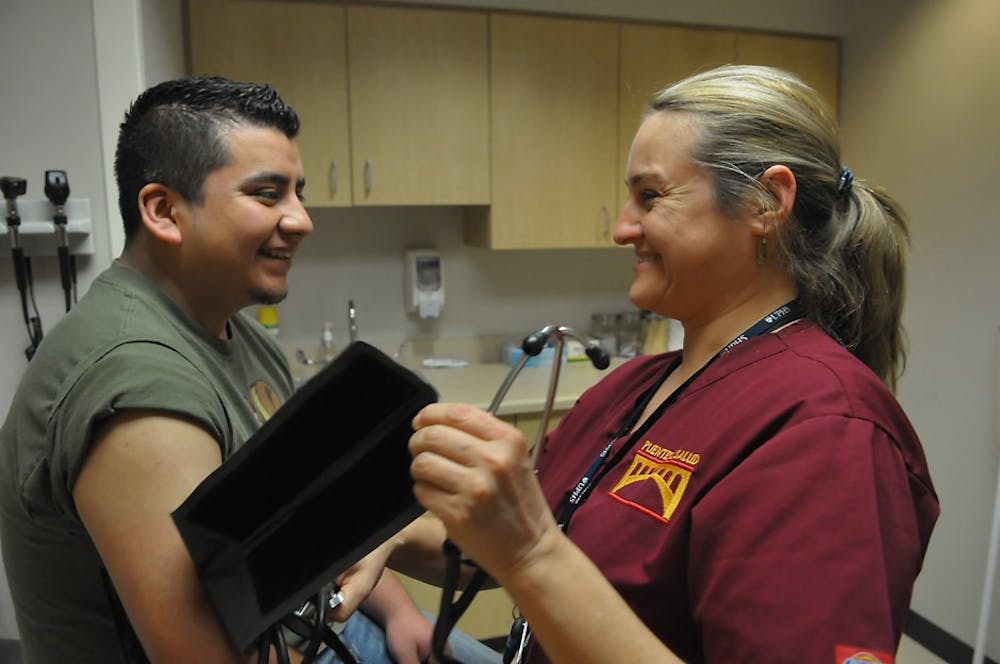Targeting the Mexican community of South Philadelphia, Puentes de Salud — Spanish for “Bridges of Health” — is building bridges to better health in more ways than one.
The nonprofit organization, largely funded by the University and partially staffed by student volunteers, provides low-cost health care to those who are not covered under the American insurance system. According to a September report by the U.S. Census Bureau, an estimated 50.7 million individuals nationwide were uninsured last year.
Since the clinic’s debut in 2007, students and staff involved in Puentes have worked to move beyond the walls of the doctor’s office, rolling out various education programs in an attempt to create a multifaceted approach to health in the community.
According to Temple University medical student Daniel Burke, if it weren’t for Puentes de Salud or similar clinics, patients would use emergency rooms as their health care systems or would not receive primary care at all.
“A lot of people will come in and say, ‘I haven’t seen a doctor in 10 years,’” Burke, one of several student coordinators for Puentes, said.
Steven Larson, a professor in the Department of Emergency Medicine at the Hospital of the University of Pennsylvania, Matthew O’Brien, Temple University professor of Medicine and Public Health and Jack Ludmir, chairman of the Department of Obstetrics and Gynecology at Pennsylvania Hospital, initiated the idea of a nonprofit clinic in 2003, when many immigrant groups began moving to urban settings as demand for cheap labor increased.
After attending several church masses and speaking to community leaders, students and staff saw a void in support systems for a “very vulnerable population,” Larson said.
However, working with largely undocumented patients required a community-wide sense of trust in Puentes.
Annette Silva, clinical nurse liaison for the organization, said trust developed over time and by word of mouth. Silva oversees the organization’s day-to-day operations and is Puentes’ only paid employee.
“[Patients] weren’t being asked for any ID or social security number,” Silva said. “That lends itself to people not worrying about … being undocumented.”
Today, Puentes offers primary, women’s and pediatric care, serving between 30 and 35 patients every Monday and Thursday evening, and hundreds more through its social service programs.
Additionally, it provides hands-on experience in the medical field to dozens of student volunteers from Penn, Temple and other local universities.
“This is exactly the kind of clinic I want to work at,” Burke said. “This is exactly what I want to be doing for the rest of my life.”
The organization charges patients $20 for their first visit and $10 for subsequent visits.
“We feel like it’s important for patients to invest in their health,” Burke said. “This money will go back toward their health to revamp our programs and clinical services.”
However, the fees do not cover all clinical costs. When dealing with a “marginalized population,” Larson noted, “if you don’t have the money, you have to get creative.”
Most of the funding for Puentes comes in the form of grants and support from the Provost’s office. Additionally, the University of Pennsylvania Health System provides clinic space every week free of charge, prompting the clinic’s move earlier this year from the basement of St. Agnes Medical Center to Penn Medicine’s facilities at 18th and South streets.
While the health care clinic is the “core” of Puentes de Salud, the organization is now turning toward preventative care and education, including a program to help diabetes patients manage their illness.
Silva recalls seeing diabetics enter the clinic with extremely high sugar levels, looking “like walking time bombs.”
“The idea is not to continue to wait for the diabetic patient, but to empower that diabetic to understand his condition and help himself,” Larson said.
Other measures include a nutrition initiative and an after-school tutoring program, which offers homework support to immigrant students at Southwark Elementary School every Monday. Although it does not provide direct health-related attention, the ultimate, “idealistic” goal is to foster better education and therefore better health in students' futures, according to the program's director, Daphne Owen.
“If you don’t help the younger generation, they’re not going to advance as much,” College junior and program tutor Diana Olivos said. “A little bit helps, and it can go a long way.”
The goal of the program, Owen said, is to bring together students’ home life and school life by helping them “be successful in school here in America, but not lose important parts of who they are.”
Also bridging the gap between Mexico and the United States are “promotoras,” or local community leaders who help promote Puentes’ services throughout Philadelphia’s Latino population.
Susana Pimentel began working for Puentes de Salud almost two years ago. Initially motivated by spare time and an interest in learning, Pimentel became a promotora and helped raise awareness of human papillomavirus (HPV) and cervical cancer within the female population. This program ran for two years, and now a nutrition initiative has taken its place.
“Talking about sex, HPV and all of that is taboo … in Mexico,” Pimentel said, adding that workshops and clinical exams were “eye-opening for a lot of [women].”
Pimentel is one of four female promotoras. When the social work initiatives first began, promotoras visited homes, laundromats, soccer games and churches — among other community locations — to inform families about Puentes. Today, however, community members actively seek out promotoras for support.
“They have been life-saving for a lot of people,” Pimentel said.



